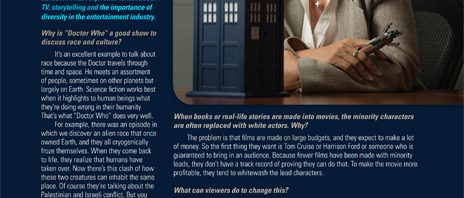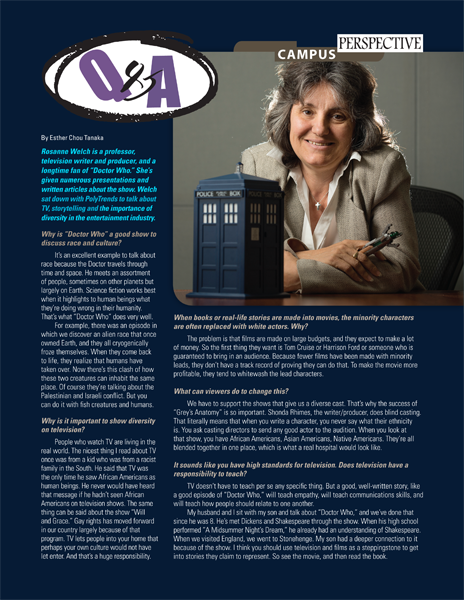Download the PDF version of PolyTrends Summer 1014
Campus Perspective Q&A with Dr. Rosanne Welch By Esther Chou Tanaka
Rosanne Welch is a professor, television writer and producer, and a longtime fan of “Doctor Who.” She’s given numerous presentations and written articles about the show. Welch sat down with PolyTrends to talk about TV, storytelling and the importance of diversity in the entertainment industry.
Why is “Doctor Who” a good show to discuss race and culture?
It’s an excellent example to talk about race because the Doctor travels through time and space. He meets an assortment of people, sometimes on other planets but largely on Earth. Science fiction works best when it highlights to human beings what they’re doing wrong in their humanity. That’s what “Doctor Who” does very well.
For example, there was an episode in which we discover an alien race that once owned Earth, and they all cryogenically froze themselves. When they come back to life, they realize that humans have taken over. Now there’s this clash of how these two creatures can inhabit the same place. Of course they’re talking about the Palestinian and Israeli conflict. But you can do it with fish creatures and humans.
Why is it important to show diversity on television?
People who watch TV are living in the real world. The nicest thing I read about TV once was from a kid who was from a racist family in the South. He said that TV was the only time he saw African Americans as human beings. He never would have heard that message if he hadn’t seen African Americans on television shows. The same thing can be said about the show “Will and Grace.” Gay rights has moved forward in our country largely because of that program. TV lets people into your home that perhaps your own culture would not have let enter. And that’s a huge responsibility.
When books or real-life stories are made into movies, the minority characters are often replaced with white actors. Why?
The problem is that films are made on large budgets, and they expect to make a lot of money. So the first thing they want is Tom Cruise or Harrison Ford or someone who is guaranteed to bring in an audience. Because fewer films have been made with minority leads, they don’t have a track record of proving they can do that. To make the movie more profitable, they tend to whitewash the lead characters.
What can viewers do to change this?
We have to support the shows that give us a diverse cast. That’s why the success of “Grey’s Anatomy” is so important. Shonda Rhimes, the writer/producer, does blind casting. That literally means that when you write a character, you never say what their ethnicity
is. You ask casting directors to send any good actor to the audition. When you look at that show, you have African Americans, Asian Americans, Native Americans. They’re all blended together in one place, which is what a real hospital would look like.
It sounds like you have high standards for television. Does television have a responsibility to teach?
TV doesn’t have to teach per se any specific thing. But a good, well-written story, like a good episode of “Doctor Who,” will teach empathy, will teach communications skills, and will teach how people should relate to one another.
My husband and I sit with my son and talk about “Doctor Who,” and we’ve done that since he was 8. He’s met Dickens and Shakespeare through the show. When his high school performed “A Midsummer Night’s Dream,” he already had an understanding of Shakespeare. When we visited England, we went to Stonehenge. My son had a deeper connection to it because of the show. I think you should use television and films as a steppingstone to get into stories they claim to represent. See the movie, then read the book.

